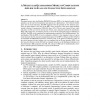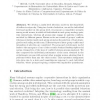276 search results - page 18 / 56 » Mathematical Modeling of Social Games |
129
click to vote
IPPS
1998
IEEE
15 years 5 months ago
1998
IEEE
The paper presents how the Random PROLOG Processor (RPP), a bio-inspired model of computations, can be used for formalization and analysis of a phenomenon - the Collective Intelli...
80
Voted
NIPS
2004
15 years 2 months ago
2004
We examine the marriage of recent probabilistic generative models for social networks with classical frameworks from mathematical economics. We are particularly interested in how ...
146
click to vote
FOSSACS
2009
Springer
15 years 8 months ago
2009
Springer
In this essay we discuss the origin, central results, and some perspectives of algorithmic synthesis of nonterminating reactive programs. We recall the fundamental questions raised...
114
click to vote
AIMSA
2008
Springer
15 years 7 months ago
2008
Springer
Abstract This paper attempts to define an emotional model for virtual agents that behave autonomously in social worlds. We adopt shallow modeling based on the decomposition of the...
100
click to vote
ECAL
2007
Springer
15 years 7 months ago
2007
Springer
We develop a multi-level selection model in the framework of indirect reciprocity. Using two levels of selection, one at the individual level and another at the group level, we pro...


